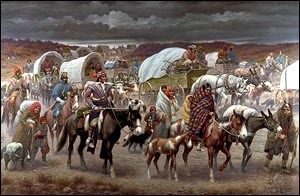Black Hawk was a Sauk leader who attempted to resist the removal of his people from Illinois. After being removed by whites, he led several hundred of his Sauk followers to claim the land that was taken from them. In response, federal troops were called up, ending in a massacre of hundreds of his followers. Black Hawk was captured, and later released from prison when he went on to publish a book, The Life of Black Hawk. A published book from an American Indian was significant because historically American Indians passed stories down orally rather than in writing.
In his book, he describes the way he and members of his tribe were treated by the white men until the time they were forced from their land in Illinois. He uses fiery language and anger towards the whites who had lied and abused his people. He describes how they destroyed his peoples’ homes and crops. He also describes a scene in which white men got the men of his village drunk on whiskey and proceeded to cheat them out of their horses and guns (Hawk 349-353). Black Hawk further describes the lack of understanding between the two cultures when he states, “My reason teaches me that land cannot be sold” (352 Hawk). This statement shows how deep the lack of understanding between the two cultures was.

Boudinot was born a Cherokee Indian in North Georgia but attended mission schools until he was an adult. His article was written in 1828, for the Cherokee Phoenix, a newspaper that focused on political and social issues facing the Cherokee tribe. The paper was also unique in that he published it in Cherokee as well as English to appeal to the broader American audience as well as get away from stories and news being passed on verbally.
In his article, “To the Public” Boudinot introduces the purpose and goals of the Cherokee Phoenix. He states that his goal is to bring attention and sympathy to the Cherokee and all American Indian tribes who are being wronged by white men and the government (Boudinot 358-360). The tone of this article is much softer than Black Hawk’s, who shows anger and frustration with whites. Despite Boudinot’s efforts, in 1835 he gives up and signs the Treaty of Echota, which led to the tribes of Georgia being forced west. The surrender of Indian lands angered many of the Cherokee people, as a result Boudinot was later assassinated by members of his tribe in Oklahoma (Boudinot 357).
Works Consulted
Hawk, Black. “Life of Black Hawk.” The Norton Anthology of American Literature, 8th ed., B, W.W. Norton & Company, 2017, pp. 349–353.
Boudinot, Elias. “Boudinot: Cherokee Phoenix.” The Norton Anthology of American Literature, 8th ed., B, W.W. Norton & Company, 2017, pp. 357–360